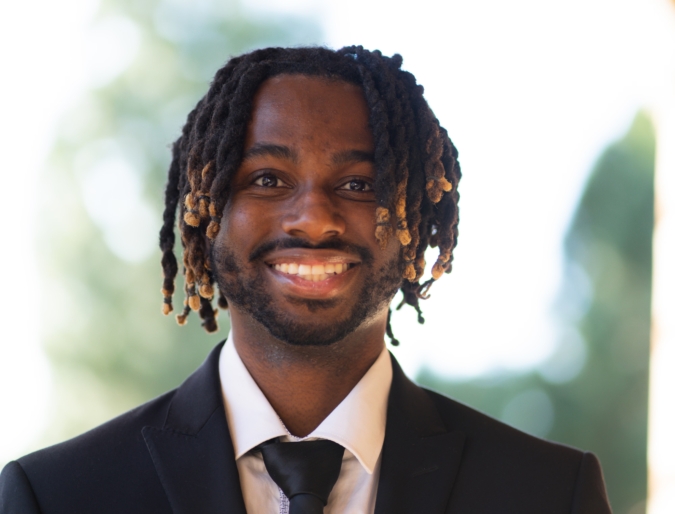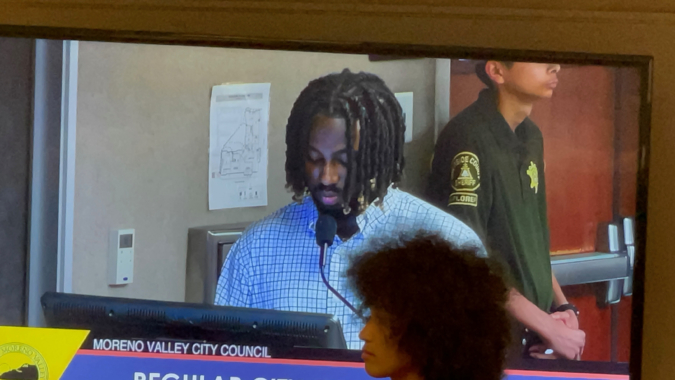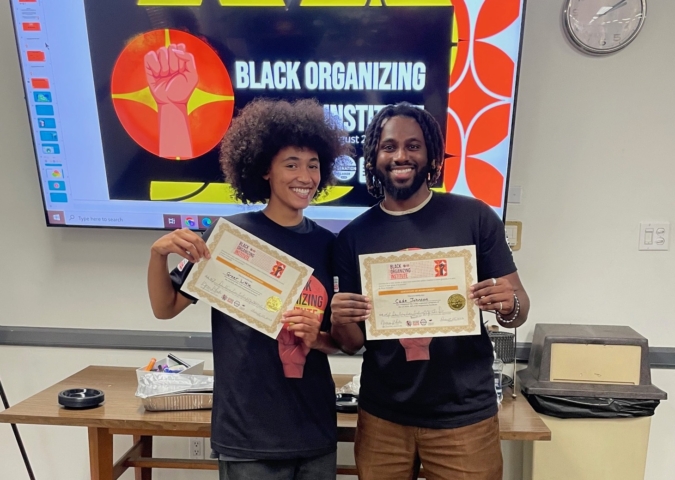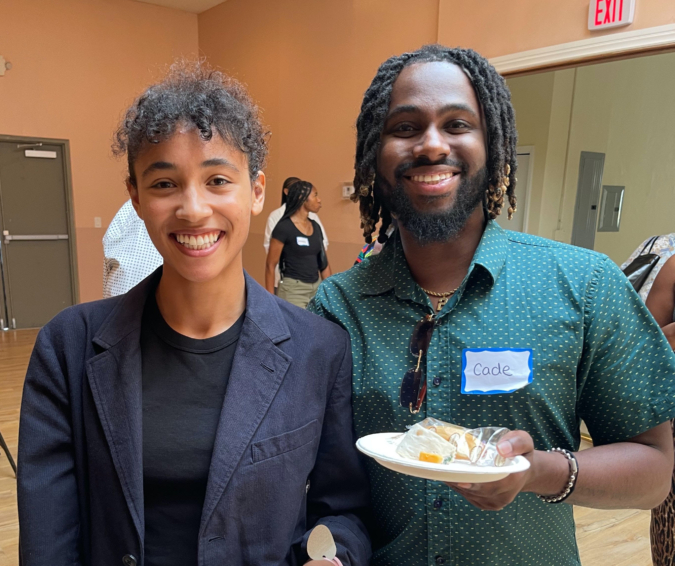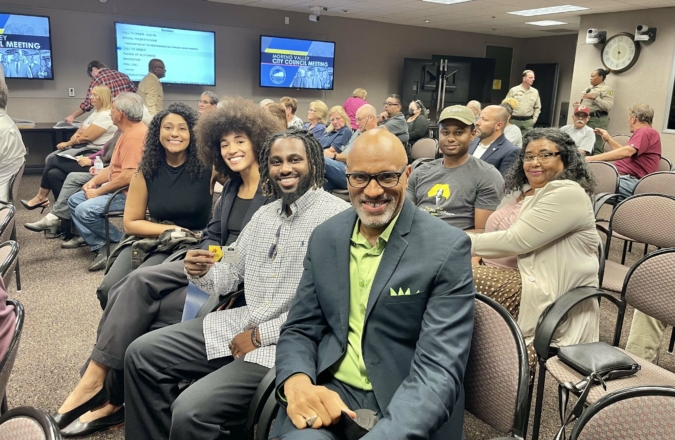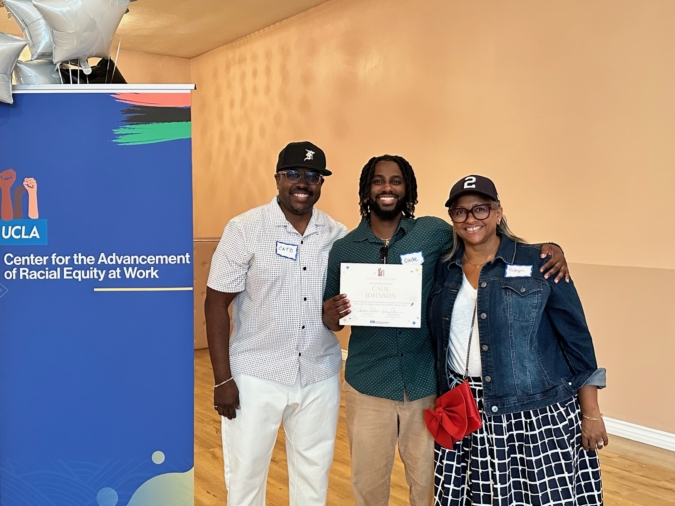Community Advocacy and Learning: Cade Johnson’s Journey with the Freedom Fellowship
Recent fellow talks about how this fellowship opened his eyes to the world of organizing
Simone Frank | April 29, 2024
Meet Los Angeles native, Cade Johnson, who recently graduated from UCLA with two degrees in political science and African-American studies. Not interested in the more corporate jobs such as business consulting that some of his peers were, Johnson focused his efforts on community-building and advocacy for those he recognized in his community as underprivileged. Johnson’s passion for the mental health of Black people led him to apply to the Freedom Fellowship summer program as he wanted to learn more about how to alleviate the stressors facing Black workers so they can be fully successful in the workforce.
Launched in the summer of 2021, the Freedom Fellowship offers an experiential learning opportunity that aims to build a bridge between students, labor leaders, union members and field organizers in partnership with the Southern California Black Worker Hub and CARE at Work’s regional Black Worker Center (BWC) partners.
Below, Johnson reflects upon his valuable experience participating in the Freedom Fellowship and CARE at Work’s cross-campus course, We Gon’ Be Alright: Developing the Next Generation of Black Organizers.
This interview was edited for length and clarity.
Why did you decide to apply to the We Gon’ be Alright class and then the Freedom Fellowship?
I actually applied for the class specifically for the fellowship. I wanted to really make something out of the African American studies major. Once I heard about the We Gon’ be Alright class and the Freedom Fellowship that it offered, I was immediately intrigued. I went to one of the info sessions beforehand and felt like I had to do this because I have a job opportunity lined up afterwards to lead me into my future career. It ended up being an amazing class and just an eye-opening experience to the world of organizing itself.
You mentioned that you’re from LA. Before the course and the fellowship, were you aware of the Black jobs crisis? How did your time in the class and the fellowship challenge or affirm what you knew about it?
I was minorly aware of the Black jobs crisis. I definitely didn’t call it that. As a kid, I was just taught by my family and other Black friends and family members that Black and brown individuals in our country don’t have the same opportunities that white people do. I would always see a Black homeless person on the street when I was very young and know that we had a disproportionate amount of us without homes, especially in LA. It carried on to me assuming that it would be harder for me to get work just because I was Black.
To your second point, I will say that the class fully illuminated the Black jobs crisis for me and taught me a lot, for example, the exact numbers of the unemployment rates between Black workers and white workers.
“I would say that my biggest takeaway, as someone who wasn’t super into organizing prior to this class, would be if you have any inkling that you want to help people or you want to start organizing, you want to advocate for rights, legislation, or whatever it is, start doing research now.”
During the hot labor summer of 2023, with protests from the Writers Guild of America (WGA), Screen Actors Guild (SAG), and the United Parcel Service (UPS) Teams just to name a few, what was it like participating in a fellowship that was so labor-oriented, while all that was happening?
That’s a great question. It just felt right. It felt like the perfect time to be doing something like that because I’ve always struggled with thinking about whether or not my interests are going to match the real world and what’s actually going on. Or if I will actually be able to make a difference and in that moment, I really felt that I was making a difference. Working in the Inland Empire Black Worker Center (IEBWC), I was able to speak face-to-face with and provide support to their pre-apprentices who were going through the center’s job training programs. Extending these types of services to more people and raising awareness for those services, I felt like I was making an impact on the Black jobs crisis positively.
What was your favorite part of the course or fellowship?
My personal favorite experience was the Black Organizing Institute (BOI). It was amazing. It was essentially a room filled with Black and brown advocates, workers and labor organizers. The president of the AFL-CIO was there. It was just insane to be able to see those people in action and be able to work directly with them. Working with actual activists and organizers who are already part of organizations like the Inland Empire Black Worker Center, the Los Angeles Black Worker Center and the SoCal Black Worker Hub was just a great experience. It was only 3 days, but the people I met, the relationships I made, and just being able to see that many Black faces that were dedicated to supporting other Black people was something that you really can’t describe. It’s priceless.
What, if any, challenges did you have to overcome during the program and how did you overcome them?
I say the biggest one for myself was the specific area that I was working in. About 9 or 10 freedom fellows get chosen and then they’re split up into different locations. It’s about 2 to 3 people per location. My coworker, Greer Little and I, who’s amazing, were working in the Inland Empire.
The Inland Empire location is amazing. They just got started in 2021. So they’re very new and need more time and funding to be a force like the Los Angeles Black Worker Center is. So that was my main challenge: essentially helping build alongside an organization from the ground up.
In terms of overcoming it, it was just communicating with my superiors and my coworkers to make sure that we all were supporting each other, not just in the work but emotionally as well. In professional settings, people tend to forget that we’re all dealing with things as well. Supporting each other in that space, being able to work with people that look like me, and think like me made it all so much easier.
What has been your biggest takeaway from this experience?
I would say that my biggest takeaway, as someone who wasn’t super into organizing prior to this class, would be if you have any inkling that you want to help people or you want to start organizing, you want to advocate for rights, legislation, or whatever it is, start doing research now. It will ultimately help you get your foot in the door and learn more and meet more people.
The community of organizing really is a community. Everyone really knows each other. Everyone knows each other’s organization. If you can get in somewhere, then you’ll have endless opportunities to move around and help whoever you want.
How has this experience helped you in your future career and educational pursuits?
It’s helped me a lot just in terms of focusing my goals and my strengths. I was able to get a new job once I finished the fellowship that didn’t specifically relate to organizing. Soon after I got the job, I actually received a call from someone that I had met at the Black Organizing Institute. She offered me work on a project she was leading. And I said, ‘That’s an amazing opportunity.’ The fact that you would just call me out of all people is insane.
I wasn’t able to accept it because I had the other job. But having those connections and understanding is great. I’ll always use that experience in my future work. It just taught me how to be a more professional person.
Do you have any advice for incoming students or fellows?
Definitely take the We Gonna be Alright class, fellowship or not. That class is amazing. Your professor, Dr. Kendrick is the GOAT– he really is the coolest guy.
He’s young, he has energy, and he knows so much. You will be able to hear from not only him but also the great Baba Ahkili. And if you’re in the class and you love the class, definitely apply for the fellowship. It will change your life, and it will open your eyes to the world of organizing.
What are you doing currently, and what do you see yourself doing in the future?
I’m working with children on the spectrum. I’m a registered behavioral technician for a prime company. I hope to use this experience to apply to graduate schools for psychology.
I want to become a marriage and family therapist. I’ve benefited so much from therapy, so I’ve kind of shifted my focus to mental health. That kind of ties into my desire to help Black and brown people, because I’ve always wanted to open up my own therapy office that focuses specifically on speaking to Black and brown men and women. Men especially, because you know men don’t talk about their mental health as much.

